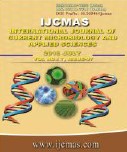


 National Academy of Agricultural Sciences (NAAS)
National Academy of Agricultural Sciences (NAAS)

|
PRINT ISSN : 2319-7692
Online ISSN : 2319-7706 Issues : 12 per year Publisher : Excellent Publishers Email : editorijcmas@gmail.com / submit@ijcmas.com Editor-in-chief: Dr.M.Prakash Index Copernicus ICV 2018: 95.39 NAAS RATING 2020: 5.38 |
The present experiment was planned integrated management of root rot pathogen in chickpea. Occurrence of root rot disease has become a major constraint in recent years for successful and profitable cultivation of chickpea. The efficacy of Bio-agent viz. Tricoderma viride, Organic amendment viz. neem cake, Plant extract, garlic, and Fungicide, Carbendanzim applied through seed treatment and soil application were evaluated against Macrophomina phaseolina causing root rot disease of Chickpea. Different alternative combination of most effective treatments that tested in pot conditions for controlling root rot of chickpea exhibited. Among the treatments soil application with neem cake @ 25g/ pot+ seed treatment with carbendazim @ 2g/kg seed (16.66 and 20.00%) followed by seed treatment with Trichoderma viride @ 4 g/kg seed + carbendazim @ 2 g/kg seed (20.00 and 20.83%) found most effective to reducing root rot incidence over control at 40 and 60 days after sowing respectively. Twenty –nine cultivars/ germplasms tested against dry root rot of chickpea in which none of cultivars found resistant. Entries H12-24, GNG 1958, IPC 2002-31, GNG 2299, IPC 10- 134, PG 0104, IPCK 2009 -165, GL 2003, H 12-26, IPC 2007-28, CSJ 515 and BG 0109 were found moderately resistance.
 |
 |
 |
 |
 |